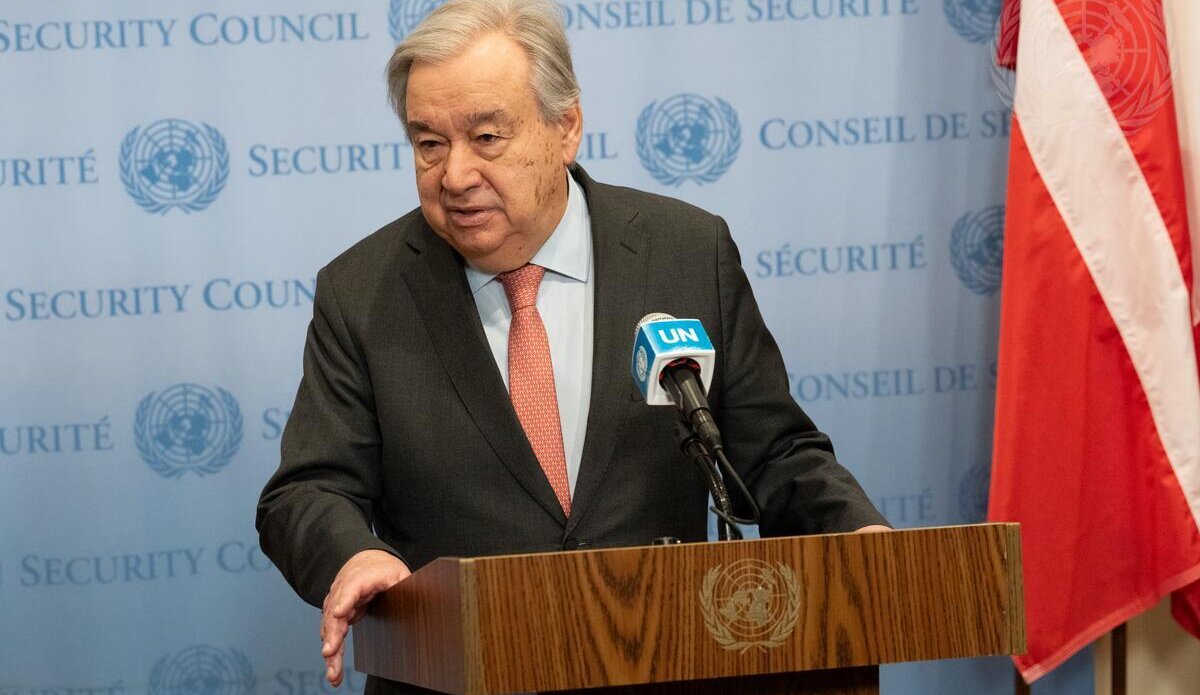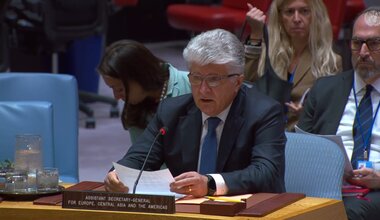The 2016 Peace Agreement has made remarkable progress, although structural problems in the country remain the main challenge to achieving sustainable peace
In challenging times, it is necessary to maintain commitment, review priorities, make strategic decisions and implement sound policies.
Bogotá, 7 April 2025. In his most recent report on the UN Verification Mission in Colombia to the Security Council, UN Secretary-General António Guterres affirms that the crisis in Catatumbo has underscored the persistence of structural challenges and factors underpinning violence in conflict-affected regions, which the Final Agreement seeks to address, such as the limited presence of the State and illegal economies, particularly illicit crops. This situation, he notes, has prompted renewed calls to accelerate the implementation of the Agreement. In view of the above, the report includes a general assessment on progress in the implementation of the Peace Agreement along with the usual quarterly update.
The report points out that the Agreement was conceived as a comprehensive set of interconnected mechanisms and programmes, aimed at addressing the causes and impact of decades of armed conflict. However, it states, in the last eight years, progress in its implementation has varied across its different sections. Recognizing the long-term nature of the Agreement, António Guterres stresses the need to maintain the course of its implementation and highlights the opportunity for this Administration to accelerate the progress achieved so far, leaving solid foundations on which to build in the future.
While there is notable progress in certain areas, some structural problems remain unaddressed, stated the Secretary-General, and added that they “threaten to undermine the prospects of sustainable peace for all Colombians. State institutions need to urgently and effectively deliver on the promises of the Final Agreement, the needs of rural communities and the expectations of Colombian society at large.”
Among the most remarkable achievements, he points out the transition to civilian life of the former FARC-EP. Nearly 9,000 weapons were handed over to the United Nations for their destruction, a very high weapons-to-combatant disarmament ratio by global standards. Eight years after the signing, the vast majority of those who laid down arms remain committed to their reintegration process. About 12,000 former combatants (27 per cent women) are formally linked to and benefit from the support of the Agency for Reintegration and Normalization (ARN), out of about 14,000 people originally accredited.
According to the report, a key challenge to the sustainable reintegration of former combatants has been ensuring access to land, which successive governments have sought to address. To date, land has been secured for 14 of the 24 territorial areas for training and reintegration (TATRs) – in which some 1,800 former combatants reside – and for 47 productive cooperatives, with almost 15,000 hectares purchased, according to ARN. Access to housing is also a major challenge for most former combatants.
Regarding political reintegration, the report highlights the transition of the FARC-EP to a political party, confirming the decision of the former guerrilla group to join the democratic system. The Comunes party has actively participated in Congress for two legislative terms via the ten seats apportioned to it under the Final Agreement. Former combatants have also engaged in local politics and community life, with some becoming elected officials and others taking on active roles as social leaders.
The expansion of political participation has made positive progress. With the enactment of the Opposition Statute, the rights and guarantees for political opposition at the national and local levels were strengthened.
Despite this progress, provisions of the Agreement with major transformative potential are yet to be fully implemented. In this regard and welcoming the current administration's strong focus on rural reform, the Secretary-General called on the Government to complement the important steps taken in the adjudication and formalization of land with efforts aimed at the productive use of land by beneficiaries. “Appropriate coordination with the implementation of other innovative instruments, namely the development programmes with a territorial focus and the national plans for rural reform, is also needed. Progress in rural reform is essential to bolster institutional presence and facilitate access to goods, services and development opportunities for communities. Effective implementation requires concrete resources, projects, and active citizen participation,” he added.
The implementation of the chapter on Comprehensive Rural Reform continues to fall short of the goals of the Agreement. According to the Ministry of Agriculture, as of February in 2025, six percent of the 3-million-hectare goal has been adjudicated as per the provisions of the Peace Agreement. The formalization of land tenure has reached 45.9 per cent of the target 7 million hectares. The current administration has contributed to 94 per cent of the hectares adjudicated so far since the signing of the Peace Agreement and 43.6 per cent of those formalized.
The report states that efforts to reduce the dependence of local communities on illicit crops have focused on substitution programmes, including the National Comprehensive Programme for Substitution of Illicit Crops, the largest one created by the Agreement, with some 99,000 participating households. However, the success of this approach has been limited, including due to lack of follow-through by the State with development assistance, promised to peasants who voluntarily eradicated coca, and the lack of more comprehensive measures.
The Peace Agreement concluded the largest insurgency spanning decades. Conflict indicators remain lower than during the height of that conflict. However, they have been steadily rising in recent years. In the report, the Secretary-General emphasizes the need to optimize complementarity between security and defense policies focused on prevention and protection of communities, ongoing peace initiatives and strategies against illegal economies.
“The current security situation in various regions of the country is concerning and requires urgent attention,” said António Guterres. “Implementation of the security guarantees provisions contained in the Final Agreement is of utmost importance, as they provide a clear and comprehensive framework within which to tackle the drivers and effects of violence that have particularly impacted rural communities, social leaders, former combatants, women, children, indigenous and Afro-Colombians.”
Former combatants have been particularly affected by ongoing violence. Since the signing of the Peace Agreement, 460 former combatants have been killed, including 11 women, 59 indigenous individuals and 57 Afro-Colombians. For the period 27 December 2024 to 26 March 2025, 19 former combatants were killed, representing a significant increase compared to the previous period (10).
The situation of social leaders continues to be of high concern. Between 27 December 2024 and 3 March 2025, the Office of the United Nations High Commissioner for Human Rights recorded 40 allegations of homicides against human rights defenders; 9 verified, 27 under verification, and 4 inconclusive.
Regarding transitional justice, the Secretary-General emphasized its central role in the success of the peace process in Colombia, as well as the need for rapid progress toward the issuance of restorative sentences. In this regard, he welcomed the decisions taken by the Special Jurisdiction for Peace (SJP) to optimize the investigations of ongoing cases. “The victims and Colombian society have waited patiently for this next stage of the process. I call upon those appearing before the SJP to maintain their commitment to truth, justice and peace and ask that relevant Government entities spare no effort to ensure they prepare the conditions enabling the implementation of the sentences, including security and adequate funding,” he said. Likewise, he stressed the importance of providing legal certainty to those involved.
The report notes that, despite the signing in November 2023 of the pact to accelerate the implementation of the Ethnic Chapter of the Agreement, which seeks to address the historical inequalities of Indigenous and Afro-Colombian peoples, as well as mitigate the disproportionate impact of the conflict on these communities, it lags significantly, particularly on issues such as land restitution and demining.
Similarly, while there has been progress in establishing institutional mechanisms to ensure women's participation in peacebuilding, there are still significant challenges to achieving tangible results. For example, women former combatants as well as rural women in general continue to face barriers in accessing land and employment.
With regards the dialogue initiatives launched to date, it is noted that they have not, in general, produced the clear and sustainable results expected. “I trust that the Government will make the necessary adjustments to prioritize those political dialogue processes with potential to provide tangible benefits for affected communities. The extent to which they enable increased State presence, in line with the Final Agreement and current security policies, should also be taken into consideration,” he added.
Recalling that peacebuilding is a non-linear and complex process, António Guterres stressed that “in challenging times, it is necessary to stay committed, revise priorities, make strategic decisions, and implement sound policies.”
The United Nations will continue to accompany and support Colombia in its efforts to consolidate peace, with the firm belief that it remains not only possible but also necessary.
The report will be presented in New York 22 April by Mr. Carlos Ruiz Massieu, Special Representative of the Secretary-General and Head of the United Nations Verification Mission in Colombia.
***
 UN
UN





